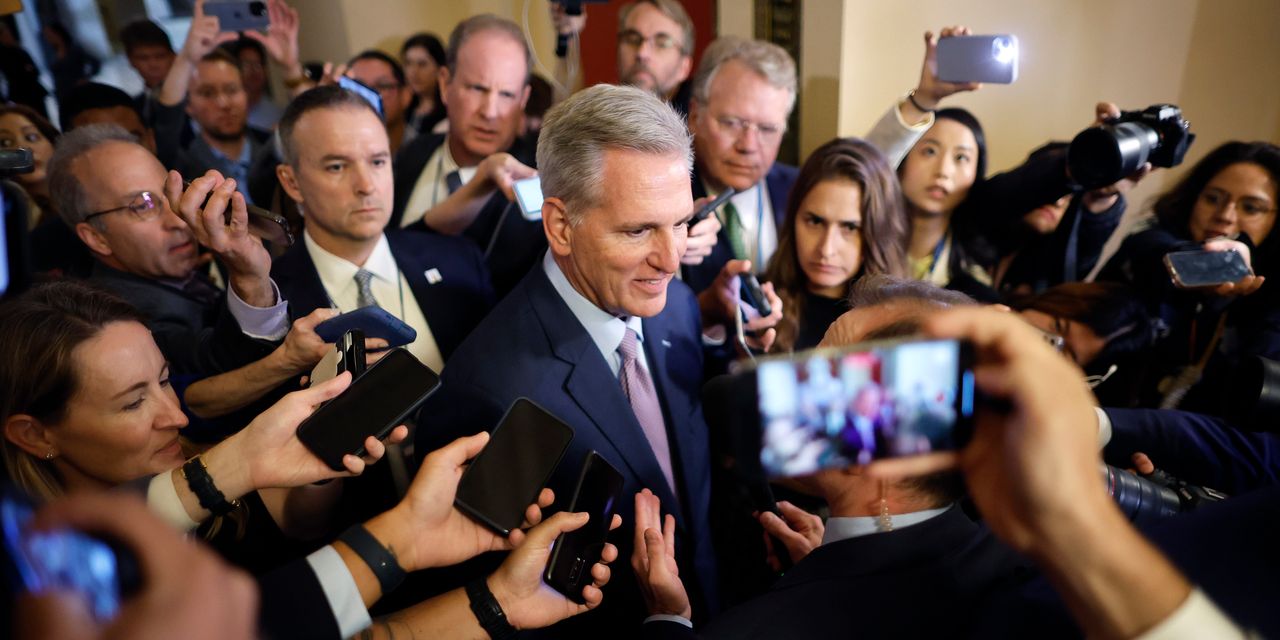Another round of political infighting that ended up spelling the end of Kevin McCarthy’s short tenure as House speaker on Tuesday wasn’t the primary driver of a selloff in stocks and bonds — but it didn’t help, analysts said.
Continued dysfunction in Congress goes a long way toward explaining why the bond market has been ”out of sorts,” said Jamie Cox, managing partner for Harris Financial Group, in emailed comments.
As the House began to vote on a motion by Republican Rep. Matt Gaetz of Florida to remove McCarthy from the speakership, stocks closed sharply lower. The Dow Jones Industrial Average
DJIA
fell more than 430 points, or 1.3%, to wipe out its 2023 gain, while the S&P 500
SPX
posted its lowest close since June 1.
The drop came in response to a continued surge in Treasury yields that saw the rate on the 10-year note
BX:TMUBMUSD10Y
end above 4.80% at its highest since August 2007. Yields and debt prices move opposite each other.
See: Rising Treasury yields are upsetting financial markets. Here’s why.
McCarthy, a California Republican, lost the gavel as 216 members of the House voted in favor of ousting him while 210 supported him in a historic challenge.
Read: Kevin McCarthy ousted as House speaker, falling after historic challenge by Matt Gaetz
Analysts have pointed to a number of factors behind the continued climb in yields, including the Federal Reserve signaling last month that rates could stay high through 2024 and beyond.
But market watchers said continued drama in Washington is doing nothing to soothe market volatility, with the showdown over McCarthy’s fate the result of a last-minute deal over the weekend that saw lawmakers temporarily avert a government shutdown. The latest turmoil comes just months after a debt-ceiling showdown that put the U.S. government on the brink of a first-ever default.
“Investors are sick and tired of being jerked around with out of control spending, the inability to govern, and the constant dragging of markets to the edge of economic calamity with shutdowns and debt ceiling nonsense,” Cox wrote.
McCarthy’s removal means a mid-November government shutdown, when stopgap funding runs out, is now an 80% probability, said Terry Haines, founder of Pangaea Policy, in a note.
“[I]t’s not a one-off shutdown markets should be concerned about, but increased volatility for at least 3 months where markets won’t know final decisions on U.S. government annual spending, particularly in government-dependent sectors including defense, semiconductors, and healthcare,” Haines said.
Tom Essaye, founder of Sevens Report Research, warned that the ”more dysfunctional” Congress appears, ”the higher yields go and the more stocks drop.”
”So, while congressional dysfunction isn’t the main reason yields are volatile, it is a contributor and the sooner Washington removes itself from the market dialogue, the better,” he said in a Tuesday morning note.
Read the full article here













Leave a Reply